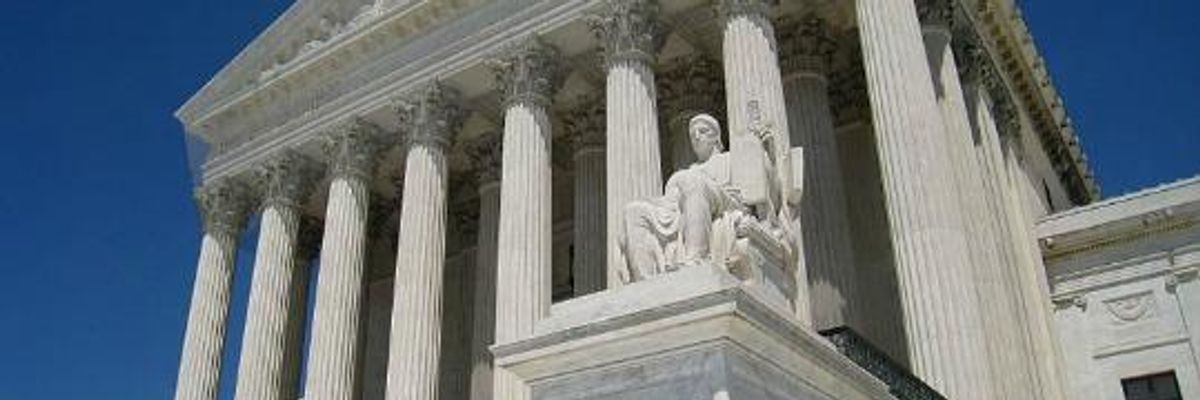
Supreme Court building, Washington, DC, USA. Front facade. (Photo: Daderot / Wikimedia Creative Commons)
To donate by check, phone, or other method, see our More Ways to Give page.

Supreme Court building, Washington, DC, USA. Front facade. (Photo: Daderot / Wikimedia Creative Commons)
In a boon to the role of big money in politics, the Supreme Court on Wednesday narrowly struck down overall limits on the amount of money individuals can contribute to candidates, parties and political action committees during the federal two-year election cycle.
The decision left the cap of $2,600 per election that an individual can give to any single federal candidate but removed the limit on the grand total that can be contributed to all federal candidates.
The ruling means that a single person can write a $5.9 million check for expenditure by candidates, political parties and political committees, according to Public Citizen.
"This is truly a decision establishing plutocrat rights," said Robert Weissman, president of Public Citizen, slamming the ruling as a "devastating blow at the very foundation of our democracy."
The 5 to 4 ruling written by Chief Justice John Roberts follows the widely criticized Citizens United v. Federal Election Commission ruling in 2010 that allows corporations to independently spend unlimited amounts of money to influence politics.
"Today's decision in McCutcheon v. FEC is Citizens United round two, further opening the floodgates for the nation's wealthiest few to drown out the voices of the rest of us," said Miles Rapoport, president of Common Cause.
"With these two rulings, corporations and billionaires like the Koch brothers will be able to use their money to buy more influence in more places, gaining a tighter grip on our government," said Wenonah Hauter, executive director of Food & Water Watch.
Commentary and updates are being posted on Twitter.
Trump and Musk are on an unconstitutional rampage, aiming for virtually every corner of the federal government. These two right-wing billionaires are targeting nurses, scientists, teachers, daycare providers, judges, veterans, air traffic controllers, and nuclear safety inspectors. No one is safe. The food stamps program, Social Security, Medicare, and Medicaid are next. It’s an unprecedented disaster and a five-alarm fire, but there will be a reckoning. The people did not vote for this. The American people do not want this dystopian hellscape that hides behind claims of “efficiency.” Still, in reality, it is all a giveaway to corporate interests and the libertarian dreams of far-right oligarchs like Musk. Common Dreams is playing a vital role by reporting day and night on this orgy of corruption and greed, as well as what everyday people can do to organize and fight back. As a people-powered nonprofit news outlet, we cover issues the corporate media never will, but we can only continue with our readers’ support. |
In a boon to the role of big money in politics, the Supreme Court on Wednesday narrowly struck down overall limits on the amount of money individuals can contribute to candidates, parties and political action committees during the federal two-year election cycle.
The decision left the cap of $2,600 per election that an individual can give to any single federal candidate but removed the limit on the grand total that can be contributed to all federal candidates.
The ruling means that a single person can write a $5.9 million check for expenditure by candidates, political parties and political committees, according to Public Citizen.
"This is truly a decision establishing plutocrat rights," said Robert Weissman, president of Public Citizen, slamming the ruling as a "devastating blow at the very foundation of our democracy."
The 5 to 4 ruling written by Chief Justice John Roberts follows the widely criticized Citizens United v. Federal Election Commission ruling in 2010 that allows corporations to independently spend unlimited amounts of money to influence politics.
"Today's decision in McCutcheon v. FEC is Citizens United round two, further opening the floodgates for the nation's wealthiest few to drown out the voices of the rest of us," said Miles Rapoport, president of Common Cause.
"With these two rulings, corporations and billionaires like the Koch brothers will be able to use their money to buy more influence in more places, gaining a tighter grip on our government," said Wenonah Hauter, executive director of Food & Water Watch.
Commentary and updates are being posted on Twitter.
In a boon to the role of big money in politics, the Supreme Court on Wednesday narrowly struck down overall limits on the amount of money individuals can contribute to candidates, parties and political action committees during the federal two-year election cycle.
The decision left the cap of $2,600 per election that an individual can give to any single federal candidate but removed the limit on the grand total that can be contributed to all federal candidates.
The ruling means that a single person can write a $5.9 million check for expenditure by candidates, political parties and political committees, according to Public Citizen.
"This is truly a decision establishing plutocrat rights," said Robert Weissman, president of Public Citizen, slamming the ruling as a "devastating blow at the very foundation of our democracy."
The 5 to 4 ruling written by Chief Justice John Roberts follows the widely criticized Citizens United v. Federal Election Commission ruling in 2010 that allows corporations to independently spend unlimited amounts of money to influence politics.
"Today's decision in McCutcheon v. FEC is Citizens United round two, further opening the floodgates for the nation's wealthiest few to drown out the voices of the rest of us," said Miles Rapoport, president of Common Cause.
"With these two rulings, corporations and billionaires like the Koch brothers will be able to use their money to buy more influence in more places, gaining a tighter grip on our government," said Wenonah Hauter, executive director of Food & Water Watch.
Commentary and updates are being posted on Twitter.